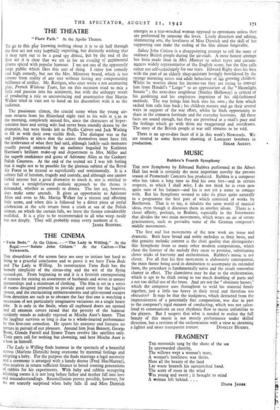THE CINEMA
" Twin Beds." At the Odeon. " The Lady is Willing." At the Regal.—" Salute John Citizen." At the Carlton.—The Newsreels.
THE absurdities of the screen farce are easy to initiate but hard to bring to a graceful conclusion and to prove it we have Twin Beds and The Lady is Willing. In construction Twin Beds has the homely simplicity of the circus-ring and the wit of the flying custard-pie. From beginning to end it is a feverish extemporising of reasons for mixing an assortment of husbands and wives in uneasy partnerships and a minimum of clothing. The film is set in a series of rooms designed primarily to provide good cover for the fugitive spouse, and the excruciating embarrassments and split-second escapes from detection are such as to obscure the fact that one is watching a succession of not particularly imaginative variations on a single hoary joke. It is only in the finale, when all cupboard doors are opened and all ottoman covers raised that the poverty of the humour suddenly stands as nakedly exposed as Mischa Auer's knees. That the laughter survives so long is due to a whole-hearted performance by this first-rate comedian. He spares his anatomy and features no torture in pursuit of our pleasure. Around him Joan Bennett, George Brent, Glenda Farrell and Ernest Truex revolve like satellites only. Their parts call for nothing but clowning, and here Mischa Auer is a host in himself.
The Lady is Willing finds humour in the spectacle of a beautiful actress (Marlene Dietridh) being overcome by maternal feelings and adopting a baby. For the purpose she finds marriage a legal necessity and a ceremony is arranged with a handy doctor (Fred MacMurray), who receives in return sufficient finance to breed teeming generations of rabbits for his experiments. With baby and rabbits occupying adjoining rooms it is not long before father and mother fall into love and misunderstandings. Reconciliation proves possible, however, for We are scarcely surprised when baby falls ill and Miss Dietrich
emerges as a tear-wracked woman opposed to operations unless they are performed by someone she loves. Lively direction and editing, shimmering sets, the loveliness of Miss Dietrich and the skill of her supporting cast make the ending of the film almost forgivable.
Salute john Citizen is a disappointing attempt to tell the story of ordinary British people during the air-raids. A more honest attempt has been made than in Mrs. Miniver to select types and circum- stances widely representative of the English scene, but the film calls rather too self-consciously for our tears. Edward Rigby does his best with the part of an elderly shop-assistant lovingly bewildered by the strange maturing tastes and adult behaviour of his growing children. Whilst he worries about his income-tax they are trying to convert him from Handel's " Largo " to an appreciation of the " Moonlight Sonata " ; the next-door neighbour (Stanley Holloway) is critical of his gardening and his employers impatient of his old-fashioned methods. The war brings him back into his own ; the firm which sacked him calls him back ; his children mature and go their several ways in support of the war effort, whilst he finds opportunity to share in the common fortitude and the everyday heroisms. All these facts are sound enough, but they are presented at a snail's pace and the feelings which go with them are exaggerated and overdrawn. The story of the British people at war still remains to be told.
There is an up-to-date facet of it in this week's Newsreels. We are treated to some first-rate shooting of Lancaster bombers in


























 Previous page
Previous page